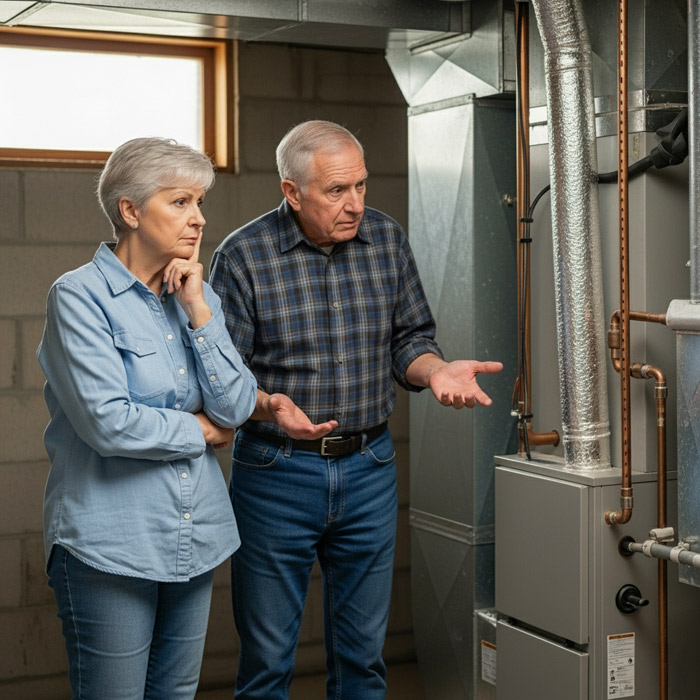
If your boiler is turning on and off too frequently, that's called short-cycling. Find out what causes it, what issues it can lead to, and how it can be resolved.
When a boiler turns on and off too frequently, homeowners face a problem called short-cycling. This pattern wastes fuel, stresses equipment, and leaves rooms uncomfortably cold. Understanding why it happens, how to spot it, and what damage it causes helps homeowners take action before small issues become expensive repairs.
What is Boiler Short-Cycling?
That repetitive clicking from your heater, where the boiler fires and then quickly goes silent, is a common heating problem. This behavior, known as boiler short-cycling, is a clear signal of a deeper malfunction. It's a condition that affects your home's comfort, your fuel bills, and your boiler's longevity.
A boiler short-cycles when it turns on but shuts down prematurely, long before the thermostat's call for warmth has been met. Moments later, the sequence starts all over again. This stop-and-start pattern prevents your heating system from ever reaching a state of stable, efficient operation. A healthy boiler should run for a sustained period to gently heat your home. A short-cycling unit, on the other hand, is stuck in a wasteful loop.
How Homeowners Discover Short-Cycling
Frequent On-Off Cycles
The most obvious sign is hearing the boiler start and stop repeatedly throughout the day. Instead of running steadily for extended periods, it activates every few minutes. This constant activity becomes impossible to ignore.
Uneven Temperatures
Some rooms feel warm while others stay chilly. Heat distribution becomes patchy because the boiler doesn't run long enough to warm the entire home evenly.
Noisy Operation
Short-cycling produces unusual sounds that alert homeowners to trouble. Controls click rapidly. Pipes bang as water flow starts and stops abruptly. The equipment makes more noise than usual.
Higher Fuel Bills
Energy costs jump when a boiler short-cycles. Starting up requires extra fuel, and constant cycling burns through gas or oil without producing proportional warmth. Bills climb despite unchanged usage patterns.
Very Short Burner Run Times Even When the Home Still Feels Cool
The burner might operate for just a minute or two before shutting off, yet rooms remain uncomfortably cold. This mismatch between runtime and comfort indicates the system isn't completing proper heating cycles.
Radiators or Baseboards Warming Only Halfway Before the Boiler Shuts Off Again
Heat emitters don't get fully warm. The boiler quits before hot water reaches the far ends of radiators or baseboard runs, leaving sections completely cold.
Boiler Reaching Its High-Limit Temperature Too Quickly
The unit hits its maximum temperature setting within minutes. This rapid temperature spike signals that heat isn't leaving the boiler and traveling through the distribution system.
A Noticeable Pause Between Cycles That Feels Shorter Than Normal
Rest periods between cycles shrink dramatically. The boiler might pause for just sixty seconds before restarting, compared to normal rest periods of fifteen or twenty minutes.
The Boiler Room Feeling Unusually Warm
Heat accumulates around the equipment instead of moving through pipes to living areas. The room becomes noticeably hotter than surrounding spaces, indicating trapped heat.
Boiler Controls Clicking On and Off More Often Than They Should
Relays and switches activate constantly. This persistent clicking reveals excessive cycling activity that wears out electrical components.
Frequent Ignition Attempts
The ignition system fires repeatedly as the boiler tries to relight after each premature shutdown. This behavior puts extra stress on ignition components.
What Causes Boiler Short-Cycling
Faulty Thermostats
Thermostats control when boilers activate and deactivate. When they malfunction, they send incorrect signals that confuse the heating system. A thermostat placed in a drafty hallway or near a sunny window detects temperature changes that don't represent the whole home. This causes premature shutdowns. HVAC contractors solve this by testing thermostat accuracy, relocating units away from problematic spots, or replacing faulty models with properly calibrated ones.
Oversized Boilers
An incorrectly sized boiler can cause short cycling. A boiler that's too powerful for the home produces heat faster than the distribution system can absorb it. The unit reaches its target temperature quickly, shuts down, cools off, then restarts. This mismatch between output and capacity drives relentless cycling. Heating contractors address this by installing buffer tanks to absorb excess heat production, allowing longer run times without triggering safety limits.
Circulator Problems
Circulators pump heated water through pipes to radiators and baseboards. When these pumps fail or run too slowly, water doesn't move through the system properly. Heat builds up inside the boiler instead of spreading throughout the home. Heating contractors fix this by testing pump performance, replacing failed units, and verifying that pump speeds match system requirements.
Low Water Levels
Boilers need adequate water to function correctly. When levels drop, there's less liquid to heat and circulate. The remaining water overheats rapidly, triggering safety shutdowns. Leaks, faulty pressure-reducing valves, or failed expansion tanks often cause this. Heating contractors correct water level problems by repairing leaks, replacing faulty valves, recharging or swapping expansion tanks, and filling the system to proper levels.
Clogged Flues
Exhaust gases must vent outside through the flue. When debris, bird nests, or corrosion block this passage, gases can't escape. Safety controls detect the problem and shut the boiler down. Heating contractors resolve this by thoroughly cleaning the flue to remove obstructions and inspecting the entire vent path for damage or improper installation.
Control Issues
Modern boilers rely on various controls and sensors to operate safely. When control boards fail, relays stick, or wiring corrodes, the system behaves erratically. Commands get lost or misinterpreted, leading to irregular cycling. Heating contractors fix control issues by testing components individually, recalibrating or replacing sensors, swapping failed control boards, and repairing corroded wiring.
Dirty or Scaled Heat Exchanger
Mineral deposits and sediment accumulate inside heat exchangers over time. This buildup acts like insulation, preventing heat transfer from the burner to the water. Temperatures spike internally while the water stays relatively cool. Heating contractors address this through chemical cleaning or mechanical descaling to remove deposits. Severe scaling might require heat exchanger replacement and installation of water treatment systems to prevent recurrence.
Poor Radiator or Baseboard Flow
Distribution components need unobstructed flow to absorb heat from the boiler. When radiator valves stick partially closed or baseboards get clogged with dust and debris, heated water can't release its warmth effectively. Heating contractors solve this by bleeding radiators to remove trapped air, verifying that all valves open fully, and cleaning dust and debris from baseboard fins.
Air Trapped in the System
Air pockets inside pipes prevent water from circulating freely. These bubbles block flow, causing the boiler to heat up quickly because water isn't moving away from the heat source. Heating contractors fix this by systematically bleeding air from all radiators, baseboards, and high points in the piping system.
Faulty Aquastat Settings
Aquastats monitor water temperature and control burner operation. If set too tightly, they trigger shutdowns before the system completes a proper heating cycle. A differential that's too narrow causes constant switching. Heating contractors recalibrate aquastats with appropriate differential settings, widening the temperature range between on and off cycles to allow longer run times.
Low Gas Pressure
Gas-fired boilers need consistent fuel pressure to operate steadily. When pressure drops below the required level, flames become unstable or extinguish entirely. The system shuts down, then attempts to relight repeatedly. Heating contractors measure gas pressure and adjust regulators to meet manufacturer specifications.
Weak Gas Valve
Gas valves control fuel flow to the burner. As they age, internal components wear out and can't maintain steady delivery. This produces irregular burner operation and frequent cycling. Heating contractors replace weak gas valves with new units that deliver consistent fuel flow.
Poor Pump Sizing
Circulators must match the system's volume and resistance. An undersized pump can't move water fast enough. An oversized pump might push water through too quickly, preventing proper heat absorption. Heating contractors recalculate pump requirements based on actual system volume, pipe diameter, and total resistance, then replace improperly sized units with correctly matched ones.
Sticking or Partially Closed Zone Valves
Multi-zone systems use motorized valves to direct heat to different areas. When these valves stick or fail to open completely, water flow gets restricted. The boiler detects reduced demand and shuts down prematurely. A heating contractor can clean and lubricate zone valves or replace units that no longer operate properly.
Bad or Drifting Temperature Sensors
Sensors tell the control system what's happening inside the boiler. When they fail or drift out of calibration, they report false readings. The boiler responds to inaccurate information, cycling at inappropriate times. Heating contractors test sensors, replace failed units, and verify proper calibration after installation.
Radiant Floor Zones That Are Too Small
Radiant floor heating requires large surface areas to absorb heat gradually. When zones are undersized, they can't accept heat fast enough. The boiler reaches its limit temperature quickly and shuts down. Heating contractors address this by adding zones, installing mixing valves, or incorporating buffer tanks to better match boiler output with floor absorption capacity.
Short Heating Calls from Smart Thermostats
Advanced thermostats sometimes issue brief heating commands based on their learning algorithms. While attempting to optimize comfort, they might request heat for periods too short for the boiler to run efficiently. HVAC contractors reprogram smart thermostats with appropriate minimum run times or recommend different models designed for hydronic systems if compatibility issues exist.
Damage Caused by Short-Cycling
Stresses Components
Every startup stresses mechanical and electrical parts. Short-cycling multiplies these stress events, accelerating wear on burners, pumps, valves, and controls throughout the system.
Wastes Fuel
Starting up requires extra fuel compared to steady operation. Constant cycling burns through gas or oil without producing proportional heat, driving up energy consumption unnecessarily.
Reduces Boiler Life
Equipment designed to last twenty years might fail in ten when subjected to excessive cycling. Premature replacement becomes necessary, costing thousands of dollars.
Temperature Swings
Homes suffer uncomfortable temperature fluctuations as rooms bounce between too cool and briefly warm. Consistent comfort becomes impossible.
Poor Heat Distribution
Heat never reaches all parts of the home effectively. Remote rooms stay cold while areas near the boiler overheat, leaving household members frustrated.
Increased Wear on Ignition Parts
Igniters, flame sensors, and pilot assemblies wear out faster from constant use. These components need replacement more frequently, increasing maintenance expenses.
Higher Maintenance Needs
Short-cycling accelerates overall system deterioration. Repairs become more frequent and expensive as multiple components fail prematurely.
More Soot Buildup
Incomplete combustion during startup produces extra soot. This accumulates in the combustion chamber and flue, reducing efficiency and potentially blocking venting.
Unstable Boiler Temperatures
Internal temperatures fluctuate wildly instead of remaining steady. This instability prevents optimal efficiency and stresses components designed for stable operation.
Added Strain on Pumps and Valves
Circulators and zone valves activate constantly instead of running smoothly through extended cycles. This shortens their lifespan significantly and increases replacement costs.
Reduced System Efficiency
Overall performance drops as the boiler wastes energy while failing to heat the home properly. Comfort decreases while operating costs increase, creating frustration and financial strain.
Short-cycling demands immediate attention from a qualified HVAC professional. The problem rarely resolves itself and always worsens over time. Homeowners who notice warning signs should schedule service promptly. Early intervention prevents minor adjustments from becoming major overhauls that drain bank accounts. Regular annual maintenance helps catch developing issues before they trigger short-cycling, protecting the investment and maintaining reliable comfort throughout cold months when heating matters most.


